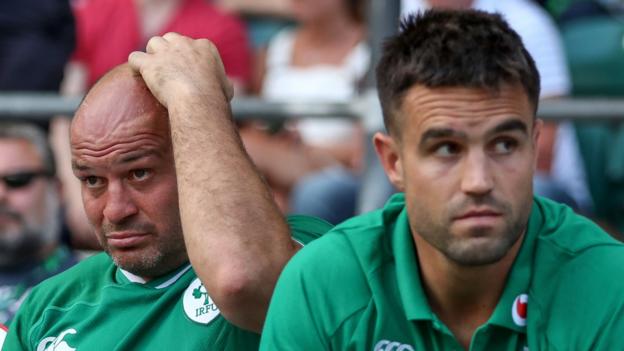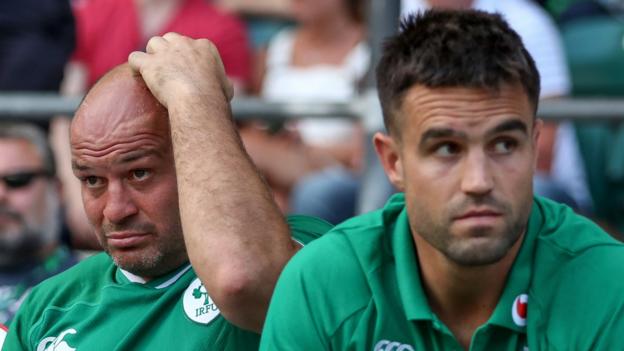Can Ireland regain form that beat All Blacks in November?
Ireland must repeat the heights of 2018 to have any hope of achieving the country’s long-held ambition of reaching a World…


| 2019 Rugby World Cup: Ireland v Scotland |
|---|
| Venue: International Stadium, Yokohama Date: Sunday, 22 September Kick-off: 08:45 BST |
| Coverage: Full commentary on BBC Radio 5 Live, BBC Radio Scotland MW and BBC Radio Ulster; plus text commentary on the BBC Sport website and app. Live on ITV |
It seems that forecasting the weather in Yokohama is a lot easier said than done.
Earlier this week we were told to brace ourselves for a Sunday downpour so biblical that it would even shock nations as familiar with rain as Ireland and Scotland.
Fears were allayed when thunder and lightning graphics were replaced by much more palatable predictions of drizzle and a light breeze, and now there are suggestions that it might not rain at all.
That leaves us approaching Sunday’s kick-off with a cautious optimism that things might actually not be too bad, but a lingering doubt that the heavens will open and all hell will break loose.
You know where I’m going with this. The parallels between predicting Yokohama’s weather and Ireland’s chances at this World Cup are uncanny.
Here is a team that, through a deeply flawed system, find themselves at the top of the world rankings.
It looks great on paper but even the most optimistic fan will know that on current form Ireland are not the world’s best team.
But they probably were 10 months ago.
When the All Blacks came to Dublin last November, Ireland smelled blood.
It just felt different. Coming off the back of a Grand Slam and a series win in Australia the sense wasn’t that Ireland were ready to give New Zealand a real run for their money, it was that Joe Schmidt’s side were ready to beat the undisputed kingpins of the sport. And they did.
From the minute the final whistle went, momentum maintenance was the name of the game.
What has followed in the last 10 months has been a confusing and often concerning offering, littered with the occasional reminder of the undoubted talent within the squad.
For most of the Six Nations you were left wondering what had happened to that chest-beating unit of 2018, as they were bullied by England and Wales, and unimpressive against Scotland and Italy.
Until quite recently, it seemed as though Ireland’s chances of a real run at the World Cup might have slipped away altogether before they touched down in Japan.
However, in two wins over Wales, albeit in warm-up matches, signs of a plan falling into place began to appear.
The relentless defensive line and destructive ball carriers re-emerged while the crucial half-back axis of Conor Murray and Johnny Sexton enjoyed their best outing in a year.
Anxiety and a front-loaded schedule
Ireland’s route to the quarter-finals has been simplified by their fixture list.
On paper their two most difficult assignments come just six days apart in the form of Scotland and Japan.
Should Ireland emerge with two wins, it’s likely that key players will be given the bulk of three weeks to rest for a quarter-final with the squad fully expected to see off the challenges of Russia and Samoa.
However, defeat on Sunday would mean Ireland’s campaign instantly becomes a knockout tournament.
The opening assignment is likely to be Ireland’s toughest of the group stages, something that Schmidt made no bones about at Thursday’s team announcement.
Unlike against Canada four years ago, Ireland’s first opponents are much more dangerous than a ‘potential banana skin’.
“There’s probably a little bit more anxiety going into this game than there was last time,” admitted Schmidt.
“[Canada] weren’t as well known to us and they weren’t in tier one.”
In Friday’s tournament opener Japan showed themselves to be the same exciting if slightly chaotic outfit that turned heads in 2015.
Ireland should have enough to comfortably overcome the hosts, but if they arrive in Shizuoka with their World Cup lives on the line, the prospect of facing Japan in front of a deafeningly partisan crowd becomes infinitely more daunting.
A quarter-final hoodoo
No coach in any sport will give the impression that they are looking beyond their next task, and Russia and Samoa will rightfully be given forensic attention in the build-up to Ireland’s two final pool games.
But Ireland advancing to the last eight is an expectation, not an achievement.
After all they’ve made it to the World Cup quarter-finals seven times in eight attempts.
But not once have they gone beyond it.
In the last two tournaments Ireland have made what looked like statement wins, against Australia in 2011 and France in 2015, as they progressed undefeated through the group stage only to falter at the first knockout hurdle.
Barring a seismic shock in Pool B, Ireland will have to face New Zealand or South Africa if they wish to break their quarter-final hoodoo.
But let’s not get ahead of ourselves by previewing a potential game that may or may not happen four weeks from now.
Irish fragility exposed this year
On the eve of Ireland’s biggest game for four years, a two-year sample size proves that in top gear they can beat any team.
Not in a one-off kind of way either, this squad of players has defeated every tier one nation since the beginning of 2018.
There have also been multiple times of late where a fragility that runs through the team has been ruthlessly exposed, particularly in heavy Six Nations defeats by England and Wales which showed a concerning inability to recover from a poor start.
The Irish fans that have travelled to Yokohama have mostly arrived with an apprehensive optimism for what lies ahead.
Most have brought their sunglasses, but have also packed an umbrella just in case.




